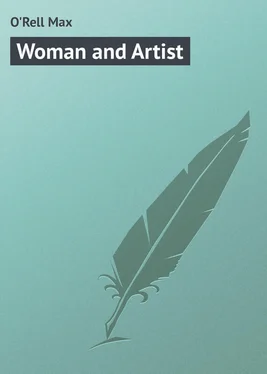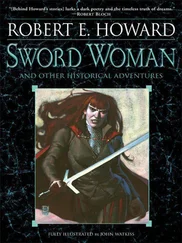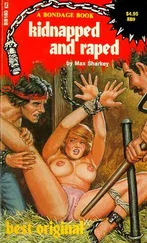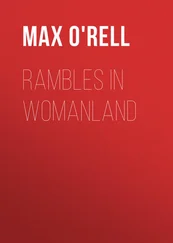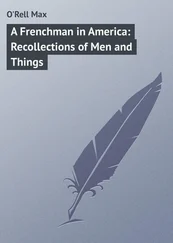Max O'Rell - Woman and Artist
Здесь есть возможность читать онлайн «Max O'Rell - Woman and Artist» — ознакомительный отрывок электронной книги совершенно бесплатно, а после прочтения отрывка купить полную версию. В некоторых случаях можно слушать аудио, скачать через торрент в формате fb2 и присутствует краткое содержание. Издательство: Иностранный паблик, Жанр: foreign_prose, на английском языке. Описание произведения, (предисловие) а так же отзывы посетителей доступны на портале библиотеки ЛибКат.
- Название:Woman and Artist
- Автор:
- Издательство:Иностранный паблик
- Жанр:
- Год:неизвестен
- ISBN:нет данных
- Рейтинг книги:3 / 5. Голосов: 1
-
Избранное:Добавить в избранное
- Отзывы:
-
Ваша оценка:
- 60
- 1
- 2
- 3
- 4
- 5
Woman and Artist: краткое содержание, описание и аннотация
Предлагаем к чтению аннотацию, описание, краткое содержание или предисловие (зависит от того, что написал сам автор книги «Woman and Artist»). Если вы не нашли необходимую информацию о книге — напишите в комментариях, мы постараемся отыскать её.
Woman and Artist — читать онлайн ознакомительный отрывок
Ниже представлен текст книги, разбитый по страницам. Система сохранения места последней прочитанной страницы, позволяет с удобством читать онлайн бесплатно книгу «Woman and Artist», без необходимости каждый раз заново искать на чём Вы остановились. Поставьте закладку, и сможете в любой момент перейти на страницу, на которой закончили чтение.
Интервал:
Закладка:
"I believe you are jealous," said she gaily.
"Not a bit – I am disgusted. Two people supposed to be sensible, billing and cooing over a package of old flowers, after being married, let me see – how long?"
"Six years to-day."
"And after six years of marriage you are still in the region of romance? Will you allow a bachelor, an intimate friend of your husband's, to congratulate you with all his heart? I declare I almost envy your happiness."
"Well, get married yourself!" exclaimed Dora; "it is very easy."
"Not for the world," said he, in a bantering tone. "I am too fond of woman in the plural to ever love one in the singular. Besides, I could never marry a woman unless I could respect her."
"Naturally."
"Well!" exclaimed de Lussac, laughing heartily, "I don't believe I could respect a woman who would be willing to marry me."
"Oh! come, you are like most Frenchmen," said Dora, "not so bad as you would make people believe. You will succumb to the temptation all in good time. You will marry, you will love your wife, and, what is more, you will make the most docile of husbands. It is the most recalcitrant of you that generally become the model husbands in the end."
"Heaven forbid! I will succumb to every temptation you like to name except that one; if I ever find myself married I shall have been chloroformed before the ceremony. For fear of giving way to this temptation I will stick to all the others, in case they should forsake me – you see, I am a vagabond pure and simple."
"Women love vagabonds – many do at any rate. You will find a hundred for one that will have you."
"A hundred perhaps – one never," said de Lussac.
"And when you are old, who will occupy the other side of the chimney corner? A chimney has two corners."
"I know it," said de Lussac; "but there is also the middle, where I shall be very happy and comfortable – that is better still. No, no, long live Liberty!"
"Pure selfishness – and besides, conjugal life is the most comfortable."
"Undeceive yourself, madame; one lives as well at the club. One dines better at a restaurant, where for a small tip one may grumble and blow up the waiter to one's heart's content."
"You can do as much in your own house, and blow up your wife without its costing you a farthing."
The light-hearted gaiety of the young man amused Dora. A woman, although she does not countenance that love of independence in her husband, admires it in other men. I feel inclined to believe that women have a mingled feeling of admiration and respect for the man who has not been caught in the matrimonial toils.
Dora was playing with the pansies that she had scattered on the table.
"You see these flowers," she said suddenly to de Lussac, "well, there is an impenetrable mystery connected with them."
"You don't say so," said he, noticing the comically majestic air she had assumed.
"Yes! a real live mystery. On our wedding-day there arrived a bunch similar to this one. Who sent it? That is the mystery. On every anniversary of our marriage, we get another. Are the flowers for Philip or for me? More mystery. Philip says they are from some old admirer of mine; from some old sweetheart of his, I say. Still they come, and are always welcome."
"I am not versed in the language of flowers," said de Lussac, "but I fancy I remember a little verse, beginning something after this fashion —
Pansies for thought —
Love lies bleeding.
I cannot recollect the words exactly, but perhaps there is a bleeding heart somewhere. Oh, this is terrible of me," exclaimed de Lussac, again looking at his watch; "it is eleven o'clock, and I am still here chattering. I ought to be at the Embassy; I must really go. Will you be kind enough to tell your husband that I will send him a wire as soon as I know something definite? – no, no, I will come myself."
"About what?" said Dora.
"Oh! about something – which concerns me."
He shook hands with Dora and went out hurriedly.
Dora, left alone, began to arrange the flowers. The pansy was a flower which fascinated her, and suggested to her mind all kinds of fantastic faces. She seemed to see sad and solemn ones, some smiling and gay, others saucy; they represented to her a perfect gallery of weird faces. She chose some of the best, made them into a little bouquet for Philip to paint in her picture. Taking away one or two that did not harmonise with her dress, she placed the bunch on her husband's easel.
"Oh, what pretty flowers!" shouted Eva, who had just come into the studio, followed by Hobbs. She was dressed to go out for her daily morning walk.
"Mama, aren't you coming out for a walk with us?"
"No, my sweet," replied Dora; "I cannot this morning. You know that daddy is going to finish my picture this morning, so I must stay with him; he will want me."
"You are always with daddy," said Eva, pouting. "You never come for a walk with me."
"How can you say such things? You know I go out very often with you – but I can't to-day. To-morrow, yes! to-morrow. Come, be a good little girl."
"A good little girl," said Eva, sighing, "that's what you always say to me."
"When I was a little girl," said Dora, trying to look serious, "I, too, had to be good, you know."
"Oh, mama! aren't you glad you're not a little girl any longer?" said Eva.
"Oh, what shall we do with her, Hobbs, if she is so naughty?" said Dora, taking the child up in her arms and covering her with kisses.
And yet, she knew that the reproaches were well-merited.
"Is it true that mama was a little girl first?"
"Of course, dear, certainly."
"Quite a little girl, and then as tall as that – and that – and that?"
"Yes! – and then like this," said Dora, touching the top of her head.
"Well, then, you had a mama, too, that's grandma, isn't it? Was she pretty, like you?"
"Much prettier."
"Did she scold you?"
"Certainly, when I was naughty."
"Isn't it funny though? – Where is daddy?"
"He is coming in a minute, dearie. Come, it is time you went for a walk, Hobbs," said Dora to the good woman, who was laughing at the child's questions; "do not stay out very long; it is chilly, and Miss Eva might catch cold."
"Very well, ma'am," replied Hobbs.
Dora, ascertaining that the child was warmly enough clad, gave her bonnet strings an extra touch, then looked at her and kissed her again and again.
Eva and her nurse went out at the studio door. The latter, finding a letter in the box, came back with it and gave it to Dora, returning again to the child.
Dora, remembering Eva's reproaches, felt the tears come into her eyes. With many women the mother kills the wife, but Dora was so much absorbed in her husband that she often reproached herself with not taking enough notice of the child. She was wife first, mother next. Yet, God knew how she adored her child.
IV
DORA
It was past noon, and Philip had not yet set to work.
For some time past Dora had noticed that Philip had no longer the same lively interest in his painting, but she had been very careful not to speak to him about it. Dora was the ideal artist's wife, not only because she understood her husband's art, but also because she was keenly alive to the conditions under which works of art are produced. If she had been the wife of Bernard de Palissy, she herself would have broken up the furniture of her home to keep alive the furnace fire. Blessed with a calm, even temperament herself, she knew that the artistic nature is sensitive, susceptible, irritable even, and that a veritable diplomacy has to be exercised daily and hourly, if one would so live with an artist as to cheer him in his moments of discouragement, to stimulate him, to give him constantly the discreet and intelligent praise he needs, when it seems to him that his imagination and his powers are forsaking him, and that he is no longer doing his best work. An artist is a piece of machinery that must be wound up every day. There is scarce an artist worthy of the name who does not think he is used up each time that he terminates a new work, and there is not a painter who, when he shows a new picture for the first time, does not watch the scrutinising gaze of the critic, much as a mother watches with anxious eye the expression of the doctor who is going to pronounce himself upon the subject of her sick child. An artist is a child, who must be constantly petted and applauded.
Читать дальшеИнтервал:
Закладка:
Похожие книги на «Woman and Artist»
Представляем Вашему вниманию похожие книги на «Woman and Artist» списком для выбора. Мы отобрали схожую по названию и смыслу литературу в надежде предоставить читателям больше вариантов отыскать новые, интересные, ещё непрочитанные произведения.
Обсуждение, отзывы о книге «Woman and Artist» и просто собственные мнения читателей. Оставьте ваши комментарии, напишите, что Вы думаете о произведении, его смысле или главных героях. Укажите что конкретно понравилось, а что нет, и почему Вы так считаете.
